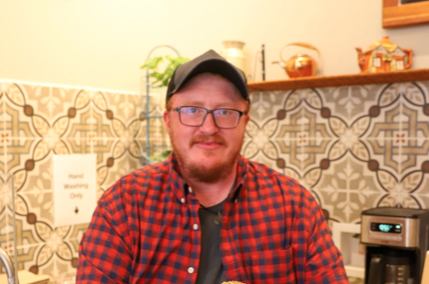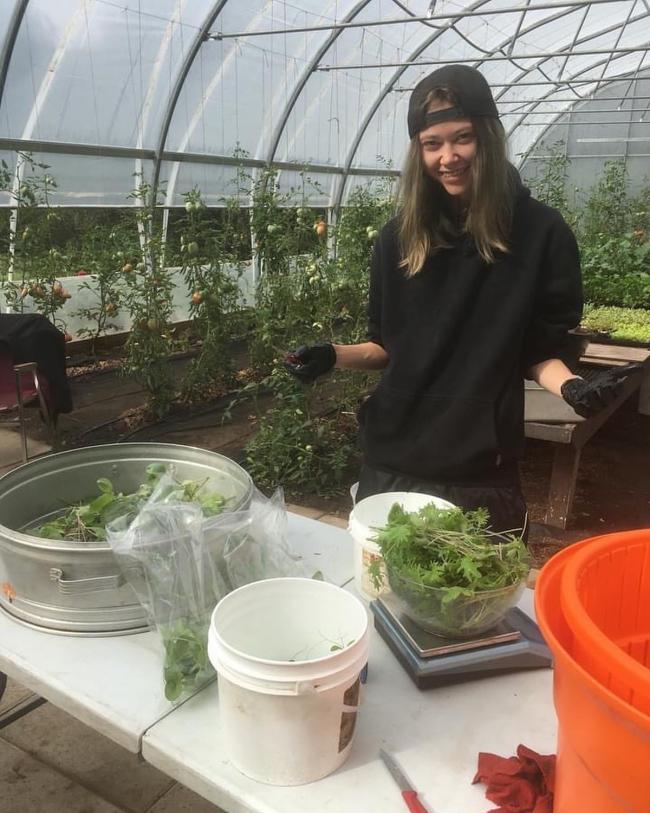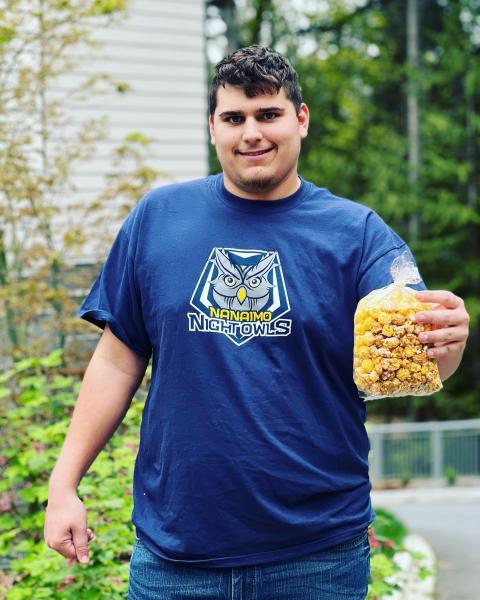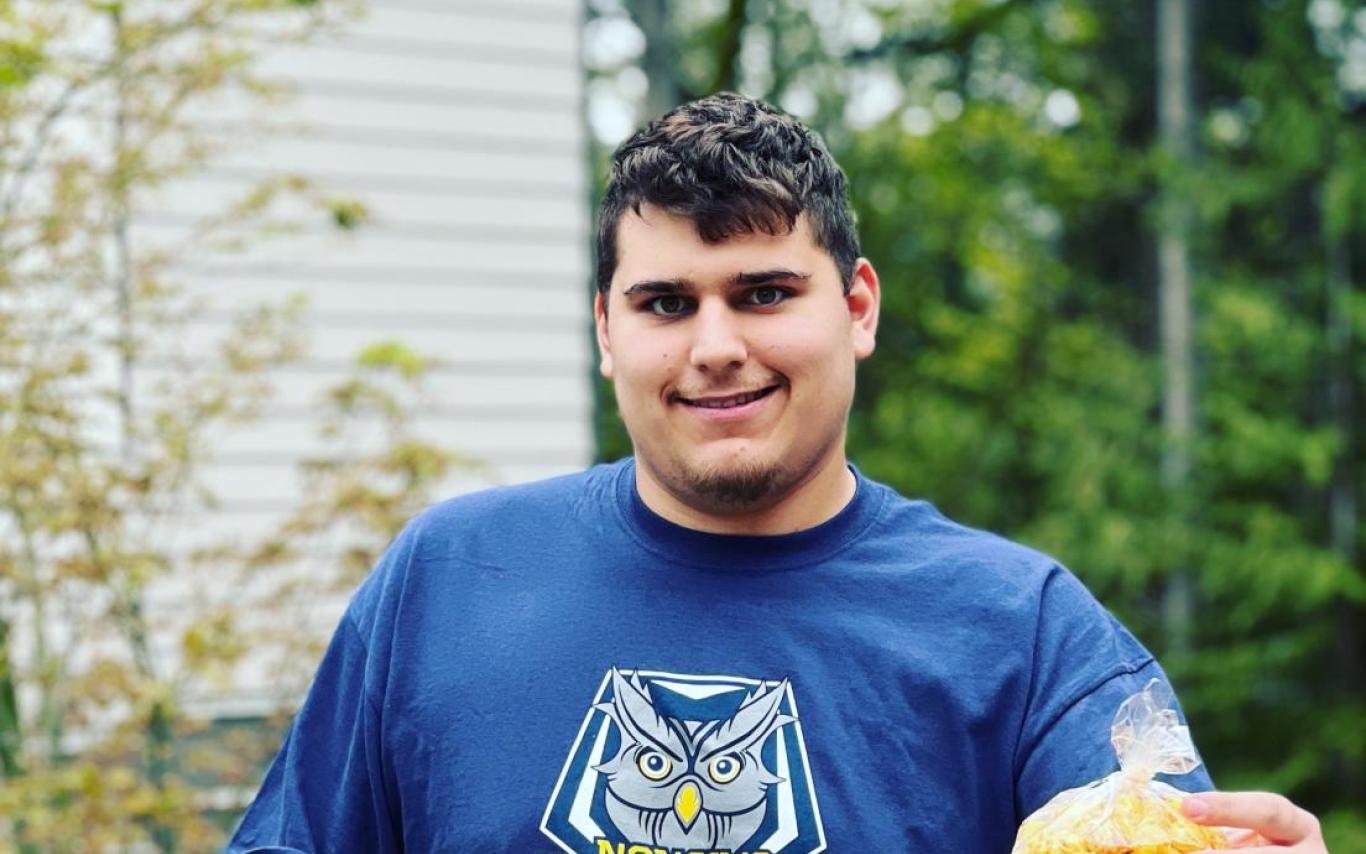Students with disabilities or who have faced employment challenges launch business start-ups through VIU entrepreneur training program.
Since 2018, VIU’s Cooperative Entrepreneur Training Program (CETP) has been offering students with disabilities or those who have faced employment challenges the opportunity to learn the essential skills of being an entrepreneur.
The 30-week program includes courses on entrepreneurial thinking, business strategy, financial literacy, marketing and mentoring. While the program went online out of necessity during the COVID-19 pandemic, it became clear that a virtual classroom opened up the program province-wide. It continues to run online so students from across Canada can access it.
The program is a safe place for students to transform their business ideas into reality, says instructor Amy Woermke.
Here are graduates of the program and their stories of how they did just that.
Benjamin Quinn – My Hubby’s Bagels

Owning his own bagel shop was a dream that began “years ago,” says Ben, owner of My Hubby’s Bagels. “I thought it was just that – a dream. I had no idea how to make it happen.”
In 2020, Ben learned about the CETP while participating in a program through Food Share that helps people with disabilities learn skills and gain experience through farming.
“As someone who lives with a disability, the idea of being an entrepreneur had a particular appeal to my need for good work/life balance,” he says. “There were grants which made participation in the CETP program accessible, so I applied.”
He took the program during the height of the pandemic, with all courses online, and while he says there were pros and cons to this, “the flexibility of meeting from home was actually really helpful at that time for me personally. The course content was accessible and what I appreciated the most was that it was applicable to a scale of business ideas. Amy made the content adaptable to the specific needs and vision of each participant. I think this was possible in part by the smaller class size.”
Ben developed a business model, found funding and opened a shop in Nanaimo.
“The business has certainly taken a few evolutions over the past few years and I am proud of all of them,” he says. “Society has a lot of false ideas of what it means to live with a disability and these ideas are often a bigger barrier to living life well then the disabilities themselves.”
Ben currently operates out of Chemainus through a collaboration with another community-oriented business that opens their kitchen and store front to passionate bakers and entrepreneurs across the Island.
“My mission statement is ‘Building community through bread and bagels,’ and staying true to this vision has been my anchor at every crossroads,” he says. “I am proud of what I have accomplished and the connections I have made. The foundation I developed through the program has been the key to watching my dream become a reality.”
Whirly Bird – Stray Coastal Moat Farm Market

Whirly Bird is the owner of the Stray Coastal Moat Farm Market, across the highway from the Nanaimo airport.
“I started the business, but the market space has been here for 44 years under two previous family-owned businesses since 1979 and it already has a regular clientele,” says Whirly.
“I want to offer good food to people who struggle with diet problems like me, and make sure they also have real food to eat because food is medicine,” Whirly shares, adding that this is what motivated her to enrol in the CEPT this year.
“I wanted to start this business before I started the program,” she says. “The CETP is good for people like myself who just need a little bit more time to figure things out and the other students were really supportive. The program helped me understand what’s involved with being an entrepreneur. They show you all the doors, but you take every single step yourself and it’s up to you to make sure you’ve ticked all the boxes.”
Owning a business like the farm market was a natural fit for Whirly, who is a farmer. Despite facing hardships Whirly quickly became involved in the community and graduated from the North Island Market Gardener Training Program in 2021. In 2022, Whirly was approached by the former owners of the market who were looking to retire.
“We thought it was a great idea, because I am also into supplying good real food, supporting local growers, feeding people, taking care of the environment, And providing a local farm hub for the community to acess” she adds. “You don’t really find these places anymore so it’s really special to us.”
Kai Stilwell – Popcorn Revolution

Anyone who’s attended a Nanaimo Nightowls baseball game might recognize the culinary brainchild of Kai Stilwell. Kai owns and operates Popcorn Revolution, the official popcorn supplier for Nightowls games.
The idea for his business came from an “aha moment” over Christmas one year, after he made caramel popcorn for people as a gift and received “glowing accolades” for his work. “Who doesn’t love popcorn?” he adds.
Kai learned about the CETP while enrolled in the Workplace Essential Skills and Training (WEST) program.
“Since I come from a family of entrepreneurs, I was interested,” he says. “I was also struggling to maintain employment and the idea of making my own schedule and having control over what I do was very appealing to me.”
Kai completed the CETP in 2021. He says the program was “enjoyable and the support I received helped me understand how to run my business and make decisions. One of the best things was the funding I received through bursaries to support the start-up of my business. It enabled me to buy good quality equipment that kick started things.”
The opportunity to share his business pitch with other community members was also a highlight of the program.
“It gave me a chance to work on my confidence and my public speaking skills while sharing my excitement for my new business.”
Kai’s business delivers “high-quality, delicious, uniquely flavoured gourmet popcorn in a variety of flavours, with the belief that there is something for everyone’s taste buds, no matter their age.”
He says creating meaningful and lasting employment is an important outcome of Popcorn Revolution, and uses his business to give back to the community as well. A portion of his profits are donated to the Pacific Autism Family Network, which supports employment for adults with autism.
As his business grows, “expansion of employees will focus on the hiring of other adults with autism while providing customers with products that they want at an affordable price. Popcorn Revolution intends to build something meaningful that serves our deepest purpose.”
Leslie Sanger – Grant Star Write Design

Although she had some experience in the field, Leslie Sanger didn’t initially intend to become a grant writer when she started the CETP. Now, her services are so in-demand that she’s had to turn some work down. “It’s a positive because it means my business is a success and growing,” she says.
Leslie started the program in 2021 after being laid off from her part-time work as a result of the COVID-19 pandemic.
“I was looking for work opportunities, so I got in touch with WorkBC and talked to them about my experiences with self-employment,” she explains.
The flexibility of the CETP, knowing she would be supported all the way through and the idea of having “at least a fundamental business” by the time she finished, drew her to the program. Although she was nervous at first, Leslie enjoyed meeting her classmates, as well as the cooperative aspects of the program.
“By year’s end, it’s quite an intimate group and I’m still in touch with some of my classmates,” she adds.
Leslie’s business is called Grant Star Write Design. As the name implies, she writes grants, both for non-profits and the business world.
“When I entered the program, I hadn’t really planned on becoming a grant writer, even though I had a lot of experience,” says Leslie. “I was looking more at becoming a content writer. I realized that the competition for that type of work would be stiff and there were already so many companies doing it, so I went into grant writing."
The program helped Leslie not only create her own business, “but also understand business language and how business people think. Now I’m able to have these business relationships and feel quite comfortable in an environment where I wasn’t sure I would be.”
Advice to future CETP students
Now set up with their own growing business ventures, all four graduates offered their advice to future CETP students:
Ben: “You don't need a specific idea of what you want to do on day one, the program will help you develop your idea. Go with an open mind and a willingness to take some risks around going outside your comfort zone. Every time I stepped into the unknown, I found the program put the support in place to help me along my way. Amy has an uncanny ability to take big ideas and break them down into practical steps, as well as make small ideas bigger than you thought possible. My advice is to go for it. The first step for me on my journey was taking the risk to try.”
Whirly Bird: “If you have a dream, you should believe in it and find the resources that are going to help you accomplish it. Getting involved with people who can support you is also helpful because on the hard days when you feel like giving up and it’s not going to work out, those people are there to cheer you on, help you to keep going and want to see you succeed.”
Kai: “Take your time. Find something you are passionate about to make into a business. It’s a lot of work but you can do it when you try your best.”
Leslie: “If you want to start a business, be prepared to commit. There will be work involved because at the beginning of the year you have a business idea and at the end of the year you have a full-blown business.”
To apply for the next program intake, visit educationplannerbc.ca.
Category: Trades & Applied technology Programs
Subject Area: Academic and Career Preparation
Program: Cooperative Entrepreneur Training Certificate Program
For questions or assistance with applications, please contact Amy Woermke at amy.woermke@viu.ca




